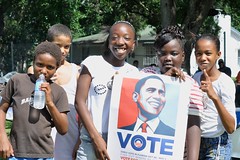On his blog, Brian Beutler remarked upon the difference between the popular perception of California as a bastion of liberal group think and the reality:
California’s a much different kind of “blue” state than is, say, Massachusetts. The dense population centers outside of San Diego and Orange counties are liberal enough to give California’s electoral votes to the Democrats every four years. But for the most part the rest of the state is bright red.
He emphasised the stark contrast between blue and red counties and concluded that in this sense, aside from the San Diego and Orange counties, California “rightfully belongs” in the same category as Oregon and Washington.
While praising Beutler’s post, Ezra Klein offers a somewhat different take. There may be a real contrast between the blue coast and the red inlands, but what it’s informed by is primarily ethnic demography:
The state’s political transformation in recent years has been somewhat ideological, but it’s been much more demographic. Namely, it’s been driven by Latino immigration. Folks think of California and conflate its politics with San Francisco and Hollywood. White, affluent, cultural liberals. But that’s not why California is reliably blue. In 2004, Bush had a five percent margin among white voters.
This sets California apart from a state like Washington, he continues:
In the aggregate, whites everywhere are somewhat conservative. But in other liberal states, they really do swing left. In Washington, Kerry had a six percent advantage among whites. In Vermont, he had an 18 percent advantage. [..] California, by contrast, is a very Democratic state, but somewhat less coherently liberal. It’s solid blue because Latinos are solid blue, not because the place is packed with liberals.
This had me thinking. On a national electoral map, when placed on a scale from clear blue to bright red, California and Washington are the same pale blue. But if the white vote in those states differs so clearly, does it look different elsewhere too? How different would the map of red and blue states look when only showing the white vote?
The 2004 Presidential election – national vote (all groups)

This map of the 2004 election results is not the usual type: the country is not artificially divided up between "blue" and "red" states. Instead, it shows the degrees in between. A state where Bush won 100% would be fiery red, a state where Kerry won every vote would be the coolest blue, and a state where the vote was divided equally is white.
Read on and view the map for white voters only beneath the fold.
Continue Reading »



